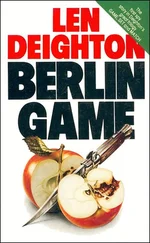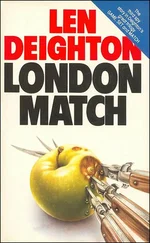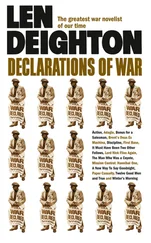Harry bit his lip. In his opinion Detective Superintendent Douglas Archer never did otherwise. Harry Woods was a policeman of the old school, scornful of paperwork, filing systems and microscopes. He liked to be talking, drinking, interrogating and making arrests.
Douglas Archer was a tall, thin, thirty-year-old. He was one of a new generation of detectives, who’d rejected the black jacket, pin-stripe trousers, roll-brim hat and stiff collar that was almost a uniform for the Murder Squad. Douglas favoured dark shirts and the sort of wide-brimmed hat he’d seen on George Raft in a Hollywood gangster film. In keeping with this, he’d taken to smoking small black cheroots as often as his tobacco ration permitted. He tried to light this one for the third time; the tobacco was of poor quality and it did not burn well. He looked for more matches and Harry threw a box across to him.
Douglas was a Londoner – with the quick wit and sophisticated self-interest for which Londoners are renowned – but like many who grow up in a fatherless household, he was introspective and remote. The soft voice and Oxford accent would have better suited some more cloistered part of the legal profession but he’d never regretted becoming a policeman. It was largely due to Harry, he realized that now. For the lonely little rich boy, in the big house on the square, Harry Woods, without knowing it, became a surrogate father.
‘And suppose the Luftwaffe petrol coupons are not forgeries; suppose they are real,’ said Douglas. ‘Then you can bet German personnel are involved, and the case will end up with the Feldgericht der Luftwaffe, Lincoln’s Inn. Waste of time our getting involved.’
‘This is murder,’ said Harry. ‘A few petrol coupons can’t change that.’
‘Don’t try to re-write the laws, Harry, there’s enough work enforcing the ones we’ve got. Any crimes involving Luftwaffe personnel, in even the smallest way, are tried by Luftwaffe courts.’
‘Not if we got over there right away,’ said Harry, running his hand back over hair that refused to be smoothed down. ‘Not if we wrung a confession out of one of them, sent copies to Geheime Feldpolizei and Kommandantur, and gave them a conviction on a plate. Oherwise these German buggers just quash these cases for lack of evidence, or post the guilty ones off to some soft job in another country.’
For Harry the fighting would never end. His generation, who’d fought and won in the filth of Flanders, would never come to terms with defeat. But Douglas Archer had not been a soldier. As long as the Germans let him get on with the job of catching murderers, he’d do his work as he’d always done it. He wished he could get Harry to see it his way.
‘I’d appreciate it, Harry, if you’d not allow your personal opinions to intrude into the preferred terminology.’ Douglas tapped the SIPO Digest. ‘And I’m far from convinced that they are soft on German personnel. Five executions last month; one of them a Panzer Division Major, with Knight’s Cross, who did nothing worse than arrive an hour late to check a military vehicle compound.’ He tossed the information sheets across to his partner’s desk.
‘You read all that stuff, don’t you?’
‘And if you had more sense, Harry, you’d read it too. Then you’d know that General Kellerman now has his CID briefings on Tuesday morning at eleven o’clock, which is just ten minutes from now.’
‘Because the old bastard drinks too much at lunch-time. By the time he reels back from the SS Officers’ Club in the afternoon he can’t remember a word of English except, “tomorrow, tomorrow!”’
Harry Woods noted with satisfaction the way that Douglas Archer glanced round the empty chairs and desks, just in case anyone had overheard this pronouncement. ‘Whatever the truth of that may be,’ said Douglas cautiously, ‘the fact remains that he’ll want his briefing. And solving a murder that we’ve not yet been invited to investigate will not be thought sufficient excuse for my not being upstairs on time.’ Douglas got to his feet and collected together the documents that the General might want to see.
‘I’d tell him to go to hell,’ said Harry. ‘I’d tell him the job comes first.’
Douglas Archer nipped out his cheroot carefully, so as to preserve the unsmoked part of it, then put it into the top drawer of his desk, together with a magnifying glass, tickets for a police concert he’d not attended, and a broken fountain pen. ‘Kellerman’s not so bad,’ said Douglas. ‘He’s kept the Metropolitan Force more or less intact. Have you forgotten all the talk of putting German Assistant Commissioners upstairs? Kellerman opposed that.’
‘Too much competition,’ muttered Harry, ‘and Kellerman doesn’t like competition.’
Douglas put his report, and the rest of the papers, into his briefcase and strapped it up. ‘In the unlikely event that West End Central ask for us, have the murder bag ready and order a car. Tell them to keep the photographer there until I tell him to go and to keep the Divisional Surgeon there, as well as the pathologist.’
‘The doctor won’t like that,’ said Harry.
‘Thanks for telling me that, Harry. Send the doctor a packet of wait-about tablets with my compliments, and remind him you are phoning from Whitehall 1212, Headquarters of Kriminalpolizei, Ordnungspolizei, Sicherheitsdienst and Gestapo. Any complaints about waiting can be sent here in writing.’
‘Keep your shirt on,’ said Harry defensively.
The phone rang; the calm impersonal voice of General Kellerman’s personal assistant said, ‘Superintendent Archer? The General presents his compliments and asks if this would be a convenient time for you to give him the CID briefing.’
‘Immediately, Major,’ said Douglas, and replaced the phone.
‘Jawohl, Herr Major. Kiss your arse, Herr Major,’ said Harry.
‘Oh for God’s sake, Harry. I have to deal with these people at first hand; you don’t.’ ‘I still call it arse-licking.’
‘And how much arse-licking do you think it needed to get your brother exempted from that deportation order!’ Douglas had been determined never to tell Harry about that, and now he was angry with himself.
‘Because of the medical report from his doctor,’ said Harry but even as he was saying it he realized that most of the technicians sent to German factories probably got something like that from a sympathetic physician.
‘That helped,’ said Douglas lamely.
‘I never realized, Doug,’ said Harry but by that time Douglas was hurrying up to the first floor. The Germans were sticklers for punctuality.
General – or, more accurately in SS parlance, Gruppen-führer – Fritz Kellerman was a genial-looking man in his late fifties. He was of medium height but his enthusiasm for good food and drink provided a rubicund complexion and a slight plumpness which, together with his habit of standing with both hands in his pockets, could deceive the casual onlooker into thinking Kellerman was short and fat, and so he was often described. His staff called him ‘Vater’ but if his manner was fatherly it was not benign enough to earn him the more common nickname of ‘Vati’ (Daddy). His thick thatch of white hair had beguiled more than one young officer into accepting his invitation for an early morning canter through the park. But few of them went for the second time. And only the greenest of his men would agree to a friendly game of chess, for Kellerman had once been the junior chess champion of Bavaria. ‘Luck seems to be with me today,’ he’d tell them as they became trapped into a humiliating defeat.
Before the German victory, Douglas had seldom visited this office on the first floor. It was the turret room used hitherto only by the Commissioner. But now he was often here talking to Kellerman, whose police powers extended over the whole occupied country. And Douglas – together with certain other officers – had been granted the special privilege of entering the Commissioner’s room by the private door, instead of going through the clerk’s office. Before the Germans came, this was something permitted only to Assistant Commissioners. General Kellerman said it was part of das Führerprinzip; Harry Woods said it was bullshit.
Читать дальше












